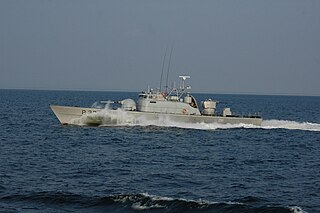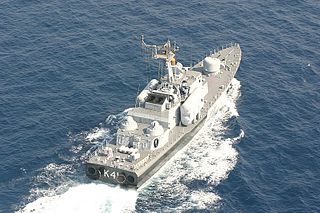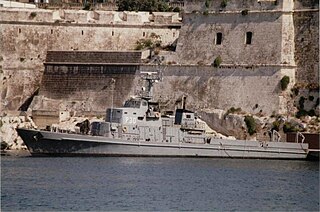
The Oliver Hazard Perry class is a class of guided-missile frigates named after U.S. Commodore Oliver Hazard Perry, a commander noted for his role in the Battle of Lake Erie. Also known as the Perry or FFG-7 class, the warships were designed in the United States in the mid-1970s as general-purpose escort vessels inexpensive enough to be bought in large numbers to replace World War II-era destroyers and complement 1960s-era Knox-class frigates.
Ship commissioning is the act or ceremony of placing a ship in active service and may be regarded as a particular application of the general concepts and practices of project commissioning. The term is most commonly applied to placing a warship in active duty with its country's military forces. The ceremonies involved are often rooted in centuries-old naval tradition.

A corvette is a small warship. It is traditionally the smallest class of vessel considered to be a proper warship. The warship class above the corvette is that of the frigate, while the class below was historically that of the sloop-of-war.

The Independence-class aircraft carriers were a class of light carriers built for the United States Navy that served during World War II.

The Oregon City class was a class of heavy cruisers of the United States Navy. Although ten ships of this class were planned, only four were completed – one of those as a command ship. The three ships completed as cruisers were in commission from 1946 to 1980, one having been converted to a guided missile cruiser (CG).

The Kashin class, Soviet designation Project 61, were series of anti-aircraft guided-missile destroyers built for the Soviet Navy since the 1960s. As of 2020, no ships remain in service with the Russian Navy, but three modified ships continue in service with the Indian Navy as Rajput-class destroyers.

The Storm-class patrol boat was a series of fast patrol boats (FPB) consisting of 20 vessels built for the Royal Norwegian Navy.

The Belgian Navy, officially the Naval Component of the Belgian Armed Forces, is the naval service of Belgium.

The Petya class was the NATO reporting name for a class of light frigates designed in the 1950s and built for the Soviet Navy in the 1960s. The Soviet designation was "Storozhevoi Korabl`" Project 159.

The Cyclone-class patrol ships are a class of coastal patrol boats, formerly in service with the United States Navy. Most of these ships, named for weather phenomenae, were launched between 1992 and 1994. The primary mission of these ships is coastal patrol and interdiction surveillance, an important aspect of littoral operations outlined in the Navy's strategy, "Forward...From the Sea." These ships also provided full mission support for U.S. Navy SEALs and other special operations forces. Several ships of the class were transferred to the U.S. Coast Guard (USCG) for a time and then later returned.
HMNZS Tui, formerly USNS Charles H. Davis (T-AGOR-5), was one of nine Conrad class oceanographic ships built for the United States Navy (USN), that later saw service in the Royal New Zealand Navy (RNZN). Serving with the USN from 1963 to 1970, these ships were designed to perform acoustic experiments on sound transmission underwater, and for gravity, magnetism and deep-ocean floor studies.
USS Scuffle (AM-298) was an Admirable-class minesweeper built for the United States Navy during World War II. She was awarded a Presidential Unit Citation and five battle stars for service in the Pacific during World War II. She was decommissioned in June 1946 and placed in reserve. While remaining in reserve, Scuffle was reclassified as MSF-298 in February 1955, but never reactivated. In October 1962, she was sold to the Mexican Navy and renamed ARM DM-05. In 1994, she was renamed ARM General Felipe Xicoténcatl (C53). She was sunk as an artificial reef and dive attraction off of Cozumel in 1999, and was stricken from the rolls of the Mexican Navy in 2000.

The Veer-class corvettes of the Indian Navy are a customised Indian variant of the Soviet Tarantul class. They form the 22nd Missile Vessel Squadron.

The Project 89 minesweeper, also known as the Kondor class, was a class of minesweepers designed in the German Democratic Republic which was given the NATO designation of "Kondor". There were three versions, namely, the prototype unit, Project 89.0; the first version, Project 89.1 ; and the second version, Project 89.2.










